
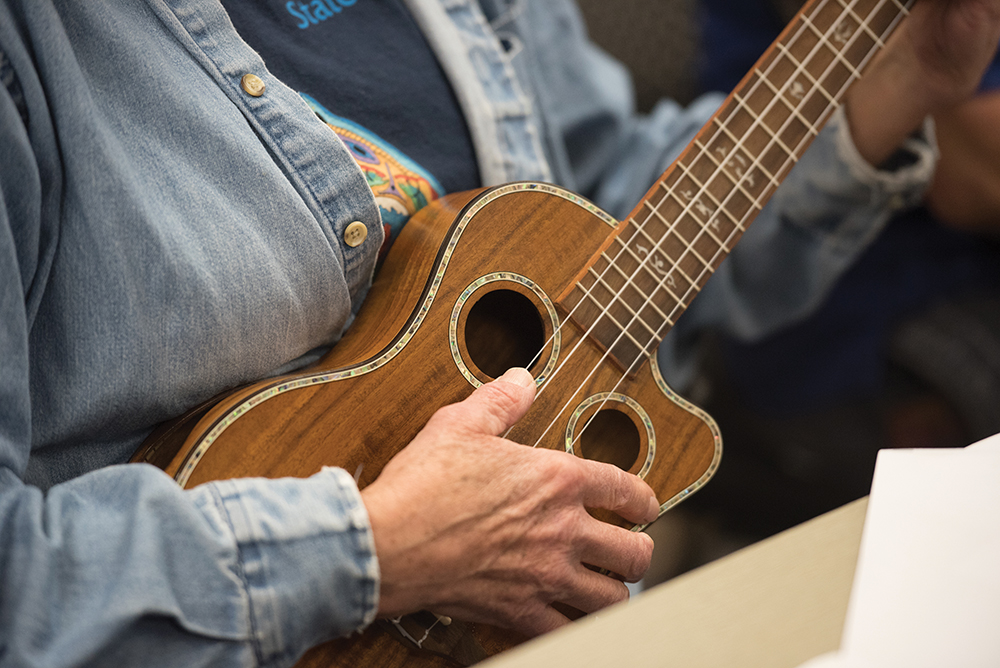
Explore all things ukulele at the Library! Read about our ukulele programs or get five tips to get started.
HAPPY HARMONIES: MAKING MUSIC AT THE LIBRARY
They say all it takes to learn how to play the ukulele is practicing 30 minutes a day for 30 days.
On select evenings each month at three libraries across Jefferson County, amateur musicians gather to do just that: practice and strum the night away on a ukulele.
Ukulele Wednesday started it all as an opportunity for ukulele enthusiasts to practice their craft together in community. After high interest in beginner programming and a partnership with the Rocky Mountain Ukulele Orchestra, Golden community members started meeting to test out chords, meet new friends and enjoy the fellowship of song.
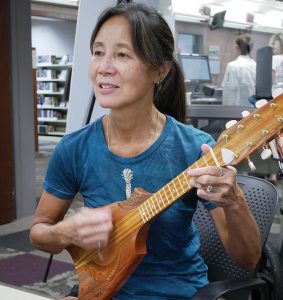
Since those early days, the group has grown into a steady series of monthly practices. In addition to the group at Golden, Evergreen Library offers a Beginner Ukulele Workshop and Ukulele Tuesday program two Tuesdays a month. Columbine Library also hosts Ukulele Thursdays one night a month.
“It’s definitely fun to sing along with other people,” says Stephanie Douglas, adult services librarian at Golden Library, regarding the program’s growing success. Stephanie helped launch the program at Golden and participates in the group herself. “And that’s where this is fun. It’s just an hour and a half of singing and playing.”
“It’s always fun. That’s why we keep coming back,” says Bruce, one of the regulars of the Golden group. He’s been playing music for over 45 years and been playing the ukulele for four. He’s only ever missed one Ukulele Wednesday program.
“We’re very relaxed here,” shares Bob, another regular at Golden and member of the Rocky Mountain Ukulele Orchestra.
The same could be said for the Library’s other ukulele groups. Each offers a similar structure: show up with your instrument, say hello, then simply play. At Evergreen, the night starts with a hands-on lesson for novices during the Beginner Ukulele hour; then, the education continues with a brief lesson from local amateur musician Stephen Venters on musical theory during the Ukulele Tuesday program. Each group, comprised on average of 10 musicians from all skill levels, is supportive, gracious and abundantly welcoming.
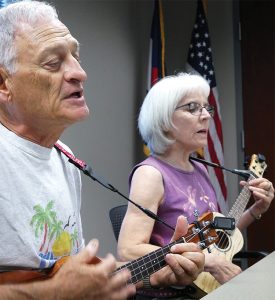
“Play what you can. Just come in when you see a chord you know,” says Polly Tagg, the adult services librarian from Evergreen to a crowd of brand new beginners.
The casual, laid-back and friendly vibe of the groups seems modeled after the instrument itself. Quintessentially bubbly, warm and mellowing, the ukulele has a universal appeal for musicians and audiences alike. During the programs, the sound of the music floats softly through the Libraries. Like Pan’s pipes, it lures curious patrons to stand in the doorway to watch, listen and tap their toes. And who can blame them? It’s enchanting to watch.
“People just seem to fall in love with ukulele,” says Emily Crowley, adult services librarian for Columbine. “Other patrons sometimes come in just to sit and listen. The music makes [the Library] feel even more welcoming.”
Lisa is a musician with the Evergreen group. She’s attended a few of both the Beginner Ukulele and Ukulele Tuesday programs over the course of the past year.
“I always wanted to learn the guitar,” she says. “But the ukulele is easier.”
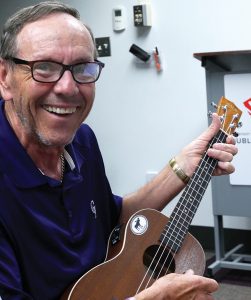
The accessibility and ease of use is certainly part of the ukulele’s appeal. With only four nylon strings and averaging only 11 ounces and 21 inches for the common soprano ukulele, it’s simple to transport, easy on the fingertips and playable for kids and adults alike.
“It’s a very approachable, very inexpensive instrument that’s good for all ages and skill levels,” Emily explains. “No one ever feels not good enough or ashamed. You’re free to experiment here.”
“Experiment”, “have fun” and “just keep trying” are the unspoken anthems during ukulele nights.
“Practice, practice, practice!” Bob says. “You’ll start to develop muscle memory for chords and things. When you play on a regular basis, it just becomes so much easier.”
Bruce agrees. “The only way to get better is to play,” he says.
Read about ukulele programs | Five steps to get started
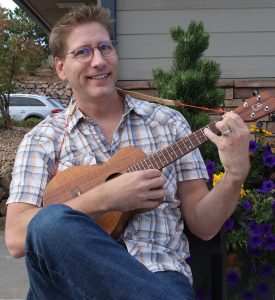 PLAY THE UKULELE: FIVE STEPS TO GET STARTED
PLAY THE UKULELE: FIVE STEPS TO GET STARTED
Stephen Venters moved to Evergreen from New York City a little over a year ago. Upon moving to the small mountain town, he stumbled upon the Library, looking for a space to host a board-gaming group. Little did he know, he would soon be a regular member, then instructor to the Library's nascent ukulele program.
Working with Polly Tagg, adult services librarian for the Library, Stephen developed curricula so that musicians of all levels might find something that appealed to them. Polly leads the introductory hour, then Stephen dives a bit deeper with theory and general musicianship during the second hour
"It just kind of fell into my lap," Stephen says of finding himself at the helm of the program. "I love helping other people learn."
Stephen, a vocal musician and banjo/ukulele player, learned musicianship while living in New York City and taking classes at The Juilliard School of Music. In his words, while "the entry into music can be difficult, the ukulele is a fantastic beginner instrument."
Learn to play with Stephen's five steps:
- Tune. "So many people don't know how to do this, or skip this step, but it's so important," Stephen says. Use an electronic tuner (or tune by ear, if you have the gift for it) to adjust your ukulele to "George Clooney Eats Ants," or G, C, E, A.
- Start with basic chords: C Major, F Major and G Major. According to Stephen, 80 percent of the songs you start playing will be in the key of C Major.
- Play what you know. Pick a couple of songs that you know and can sing along to on the radio, find an arrangement, then play. "One of the difficulties with learning music, " Stephen says, "is splitting your attention. Trying to learn a new song on a new instrument -- you're trying to learn two things at once. Have your brain focus on one thing at a time to start with." You can find different song arrangements on Stephen's website: internetchorddatabase.com. , opens a new window
- Learn the next level of chords. Once you get the basics, you can progress on to more challenging chords, including G, D and C.
- Practice. "Just play songs you like and play them again and again," Stephen concludes. "When you get 80 percent of the song right, you can try a new one."
Grab a uke and get strummin' with us at the Golden, opens a new window, Evergreen, opens a new window and Columbine, opens a new window Libraries!
Read about ukulele programs | Five steps to get started
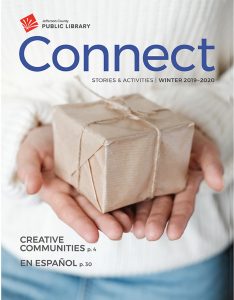 Coming soon - Connect magazine, winter edition!
Coming soon - Connect magazine, winter edition!
Keep up with the latest stories and happenings about JCPL. There's something for everyone. And it's all free at your Library.
Find your FREE copy of Connect in local businesses, all JCPL locations and online.

